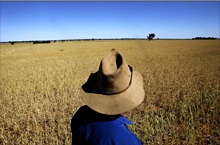The National | 28 April 2010
by Tom Arnold
Saudi companies are in talks with Australian officials about investing in agriculture, as the Gulf’s biggest economy steps up its efforts to secure food supplies.
Companies from the kingdom are meeting with representatives of the state of Western Australia to discuss buying equity in farms and investing in the wheat supply chain.
Food security is a concern as Saudi Arabia looks to feed its growing population, which is expected to expand more than 32 per cent in the next decade to 33 million.
The kingdom is seeking closer ties with wheat-exporting countries as it winds down its 30-year programme to grow the grain. Saudi Arabia achieved self-sufficiency, but its water supplies dwindled.
The kingdom aims to import all of its wheat by 2015 and this month it changed its rules to open the doors to imports from Australia, the world’s fourth-largest exporter of the grain.
“Private companies short-listed by the Saudi Arabia government to invest in food security are talking to us,” said Pankaj Savara, the regional director and trade commissioner of Western Australia’s Middle East trade office, which is in Dubai.
“We are expecting a 25 per cent rise in bilateral trade with Saudi Arabia this year.”
A delegation from the kingdom’s grain silos and flour mills organisation (GSFMO), the government agency responsible for wheat and barley supplies, recently visited Western Australia to assess investment opportunities.
Western Australia is the country’s largest grain-growing state, and about 80 per cent of its agricultural production is exported.
The state’s bilateral trade with Saudi Arabia is valued at about A$830 million (Dh2.8bn), including exports of about A$700m. Minerals such as bauxite, which is used to make aluminium, and gold are the leading exports, followed by agricultural products such as barley.
Waleed al Khariji, the GSFMO’s director general, said this month that Saudi Arabia needed at least 2.6 million tonnes of wheat this year and planned to import 700,000 tonnes of the grain by August.
In the UAE, the expansion of aluminium smelters means imports of bauxite are likely to increase this year.
And in another sign of developing ties between the two regions, Tim Groser, the New Zealand minister of trade, arrived in Saudi Arabia this week with the country’s largest business delegation to visit the Gulf.
About 90 executives from 60 New Zealand companies also visited Bahrain, Kuwait, Abu Dhabi and Dubai.
Food and beverages, specialised manufacturing, information and communications technology and education were among the sectors being promoted.
Mr Groser said New Zealand hoped to sign a free-trade agreement with the GCC this year to open the way for increased trade.
“As a country we consider ourselves part of the food security solution, whether that’s through trade or investment,” Mr Groser said.
[email protected]













